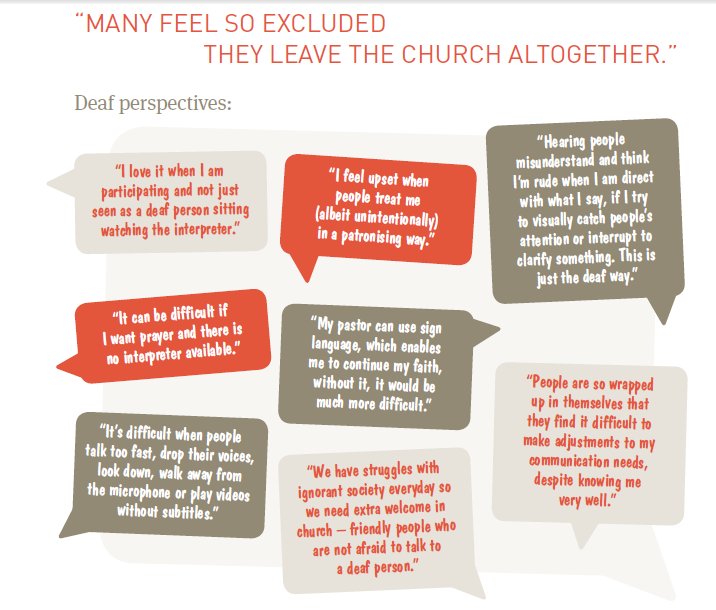30 August 2013
Church: D/deaf perspectives
You long to mix, develop friendships and be part of conversation, but no one speaks your language. Lucy Cooper explores what church is like for D/deaf people.
You are among an excited crowd, but you cannot make out words, it's muffled. Communication breakdown is isolating and frustrating for anyone.
Hearing people are often unaware that inside the Church there are D/deaf* Christians who feel like outsiders. Often in the hearing world, we unintentionally fail to consider their needs. While we aim to welcome all cultures and backgrounds, many feel so excluded they leave the Church altogether.
The challenge to the mainstream (hearing) Church is not only to recognise the need for accessible content but to challenge attitudes, creating a positive understanding and dialogue that enables D/deaf people to feel a valued part of the Church.
"A Deaf person can't just walk in to any church and gain access to what is going on. I see time and time again that it is a real struggle and that breaks my heart. The gospel is for all, deaf and hearing," says Laurence Banks (D), director of Go! Sign. In Laurence's experience, awareness of Deaf culture is rare, but even a little understanding can make information accessible and begin to build genuine relationship.
"It's a serious issue and we all need to work together to focus on the real causes and support the local Church to engage and appreciate D/deaf people as a part of the body of Christ."
Among D/deaf people there are varying degrees of hearing loss, English, speech, BSL and preferred communication methods. It cannot be presumed that D/deaf people have the same needs or want the same support. However, attention to simple details and adjustments can transform a D/deaf person's experience of church. Churches are encouraged to provide qualified interpreters as needed and ensure the hearing loop is working correctly, for instance. Having a welcome team and leaders who have learned basic sign language, good use of the PA system, advance sermon notes, clear visual presentation and uninterrupted lines of sight (for lip-reading or signing), can make all the difference.
The UK Deaf community are British Sign Language (BSL) users, and have a unique culture, language and strong sense of identity. Deaf churches worship entirely in BSL, and are often a place of belonging where D/deaf Christians express their worship freely without barriers. Within some hearing churches, D/deaf ministry is a sub-group with regular integrated services. Others have BSL interpreters to provide access to church life.
"D/deaf people are often a swamped minority, not speaking the language of the majority," says Rev Bob Shrine (D), chair of Deaf Anglicans Together and a minister in the deaf community. "Providing interpreters and access is a good start but it is not inclusion. Meaningful inclusion is D/deaf people moving from passive spectator to active participant. This happens through two-way interaction, awareness, valuing differences and allowing D/deaf people space. This gives confidence and empowers D/deaf people to bring their contributions forward."
For many, trying to follow English word order in a sermon or conversations is exhausting and disheartening because the meaning gets lost. Several talk of the emotional and illuminating moment when the gospel was presented clearly to them in BSL for the first time. Penny Beschizza (D),chair of Signs of God, explains just how empowering being able to worship in your own language is. "BSL is a fully linguistic, distinct language. Sometimes hearing people view sign language as a 'lovely tool' but it is so much more. It helps us communicate, gives us creativity and freedom in worship – conveying meaning and emotion that we may not grasp otherwise."
"The Church does sometimes undermine the gospel for Deaf/disabled people and there is more to be done together in raising awareness of cultural, inclusion and language issues. But we are beginning to see encouraging change," adds Laurence Banks.
"Fellowship is vital and contagious. When we have it, we do not feel isolated. To move forward we have to work in partnership."
Gill Behenna, national Deaf ministry adviser for the Church of England, says: "There is much work to be done but I love hearing the good news stories and the marvellous work that is being done by chaplains among D/deaf people. We enable consultation with D/deaf people and explore ways in which their faith can be encouraged and grow."
One of the most effective things we can do to encourage and involve D/deaf people in our churches is to ask them what they need and "be a friend, in the same way you would get to know anyone from a diverse culture".
"Allow them to make their own decisions,without force and meet them halfway," says Penny Beschizza.

Find out more
- Go! Sign (previously Deaf Christian Link UK)
- Signs of God
- BSL Daily Devotions
- Deaf Anglicans Together
- Christian Signs
- Book: The Church and the Deaf community by Rev Bob Shrine (D)
- Book: Deaf liberation theology by Hannah Lewis (D)
*Capital D refers to BSL users who identify themselves strongly as part of the Deaf community. Lower-case d refers to people who may be hard of hearing, prefer to use English, lip-read or use hearing loops.
You might also be interested in
- 28 Jun 2018 idea: Caribbean communities’ contribution to the UK
- 26 Jun 2018 Windrush 70th anniversary celebrates love, hope and unity
- 04 Jun 2018 Westminster Abbey to host Windrush 70th anniversary celebration
- 25 May 2018 One year on: mourn with those who mourn
- 15 Aug 2018 Refuel 2018 was a success. Bring on 2019!

